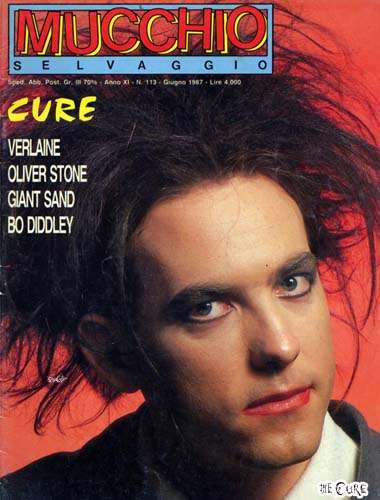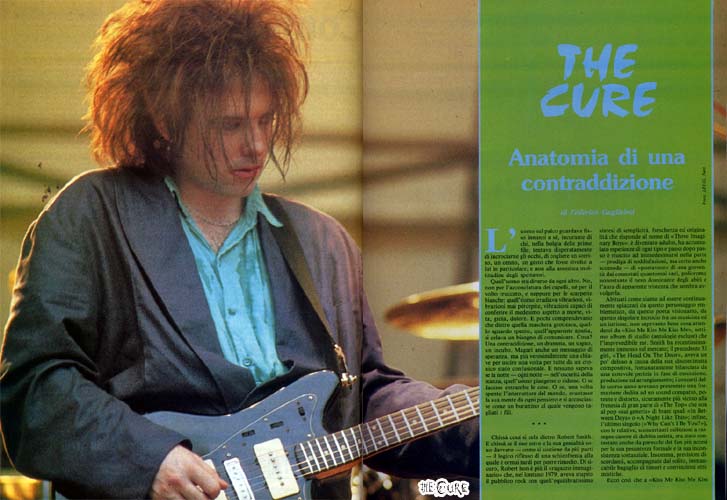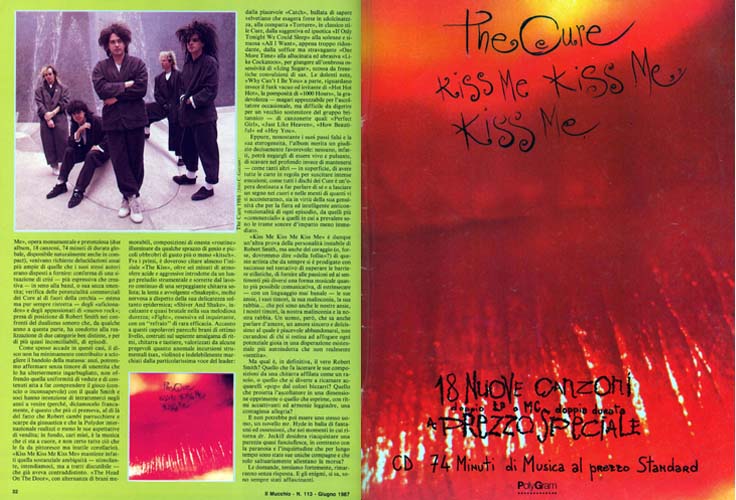Article; THE CURE – ANATOMY OF A CONTRADICTION



July 1987 - Mucchio (Italy)*
(Translation below)
Article; THE CURE – ANATOMY OF A
CONTRADICTION



THE CURE – ANATOMY OF A CONTRADICTION
by Federico Guglielmi
The man on the stage stared fixedly to his own self, careless if anyone in the first rows tried desperately to cross sights with him, to catch a smile, a nod, an aimed gesture to someone and not to the whole anonymous crowd of spectators.
That man was different from the others. No, not because of the hairdo, or the painted face, not even because of the white sneakers: that man radiated vibrations, unnoticed vibrations, vibrations capable to bring an equal aspect of death, life, joy and pain. And few understood that behind that grotesque mask, that turned-off look, that apparent apathy, smothered a need to communicate. What? a contradiction, a drama, a dream, an incubus. Maybe also, a message of hope, but most probably, a key to escape once and for all, from a chronic state of confusion. And nobody knew whether at night -every night- in the darkness of his room, that man cries or laughs. Or does both things. Or if, once the switch of the world turns off, he empties out his mind of any thoughts and lays flat as a puppet whose threads had been cut out.
* * *
Who knows what’s hiding inside Robert Smith. And who knows if his inspiration and his genius are really –as many people say- the logical reflex of a schizophrenia that’s already too late to be cured. Surely, Robert is no longer the “Imaginary Boy” who, in a distant 1979, astonished the rock audiences with the wonderfully-balanced rundown of simplicity, freshness and originality that was named “Three Imaginary Boys”: he’s a grown-up now, he gathered all kind of experiences and step by step, he managed to hop in the place –full of satisfactions but truly, also uncomfortable- of “spokesman” of a polychrome youth, despite the predominant black of its inhabitants and the shadow of seeming sadness that appears to wrap them.
Accustomed as we are to get caught by this emblematic personage, by this visionary poet, by this unique cross of a musician and an actor, we don’t know exactly what to expect of “Kiss Me Kiss Me Kiss Me”, the seventh studio album (not counting the compilations) that this unpredictable Mr. Smith had just put in the market; the previous LP, “The Head On The Door” was a bit of a let down because of its irregular quality, fortunately balanced with remarkable ability during the production and arrangement phase; last year’s concerts presented us a band devoted to achieve a compact, strong and distorted sound, surely closer to the frenzy of “The Top” than those ‘sui generis’ pop pieces like “In Between Days” or “A Night Like This”; Anyway, their last single (“Why Can’t I Be You?”) with its relative, perplexing exhibition of bizarre singing of dubious seriousness, had been objected even by many lighthearted fans due to its formal weightiness and lack of substance. Therefore, dissenting expectations along with the usual baggage of fears and optimistic convictions.
Hence, “Kiss Me Kiss Me Kiss Me”, monumental and pretentious work (two discs, totaling 74 minutes and also available in compact disc), leads us to search for even bigger clarifications than those that its own authors are willing to provide: a confirmation of a state of crisis –more expressive than creative- inside the band, or simply a denial of it; a test of the commercial capability of The Cure, outside its circle –wide but always restricted- of ‘aficionados’ and of the ‘fans’ of ‘new rock’; a take of position of Robert Smith in confrontation with the sonic dualism that, since some years ago, had led to the realization of two different, and because of it, irreconcilable categories.
As it usually happens in these cases, the record itself hadn’t slightly helped to answer any question: instead, we can state without fear of going wrong, that it has tangled it in even more, by not offering a uniformity of vision and content directed to help us to understand the game which Smith and his partners are (conscious or unconsciously) planning to play in the years to come (because, frankly speaking, this is what urges us, more than the fact that Robert changes his hairdo and his tennis shoes, or that Polydor International achieve or not his expected selling rates; in the end my dears, it’s the music the one that gets in our hearts, and not all those surroundings that give it a picturesque, however useless, character). In fact “Kiss Me Kiss Me Kiss Me” keeps that substantial ambiguity –stimulating, but let’s face it, questionable- that had already characterized “The Head On The Door”, alternating memorable songs with compositions of honest ‘groove’ illuminated with certain flashes of genius, and little works more or less ‘kitsch’. Among the first ones, we can mention at least, the initial “The Kiss”, more than six minutes of sour and aggressive atmosphere introduced by a long instrumental prelude and sustained by the continuous sound of a winding soloist guitar; the slow and wrapping “Snakepit”, too nervous in spite of its shallow softness; “Shiver And Shake”, persisting and almost brutal in its own melodic hardness; “Fight”, obsessive and disturbing, with a ‘refrain’ of strange effectiveness; Along with these masterpieces there are several songs of excellent level, build on a wise mix of rhythms, guitar and keyboards, improved by some nice yet dysfunctional instrumental assaults (sax, violin) and permanently marked by the unique voice of the leader: from the pleasant “Catch”, velvetian-flavoured ballad maybe exaggerated in sweetness, to the compact “Torture”, in classic Cure style, from the suggestive and hypnotic “If Only Tonight We Could Sleep” to the solemn and wiggly “All I Want”, barely too flowery, from the soft but extravagant “One More Time” to the wild-eyed and abrasive “Like Cockatoos”, to reach the shadowy compulsiveness of “Icing Sugar”, shocked with a convulsive frenzy sax. The painful notes, besides “Why Can’t I Be You”, run on the empty and annoying funk of “Hot Hot Hot”, the pomposity of “1000 Hours”, the mellowness –maybe suggestive for casual listeners, but hard to digest for old die-hard fans of the British band- of little songs like “Perfect Girl”, “Just Like Heaven”, “How Beautiful” and “Hey You”.
Nevertheless, despite its false steps and its heterogeneity, the album deserves a decidedly favorable assessment: in fact, no one could deny that it’s alive and pulsing, that hollows in deep space rather than keeping –like many others- in the surface, that has all the papers in order to arouse intense emotions; as every Cure record, this is a work destined to make everyone talk of it and to leave a mark in the hearts and in the mind of those who approach it, more because of its own honesty than the fiery and intelligent anti conventionalism of every single episode, from the most ‘commercial’ ones to those that have a less immediate impacting sound.
So “Kiss Me Kiss Me Kiss Me” is another proof of Robert Smith’s unstable personality, but also of the courage (or maybe we shall say, ‘of the madness’?) of this artist who always had lavished with success when trying to come through the stylistic barriers, to supply the most diverse passions and feelings with a musical form as much communicative as possible, to express –never with banal language- his concerns, his fears, his gloominess, his anger... that might also be our own concerns, our fears, our gloominess, our anger. A man, however, who knows also how to speak of love, sincere and sweet love in which is pleasant to let oneself go, but not curing those who insist to drown any potential happiness inside an existential desperation, more self induced that really ‘felt’.
But which one is finally the real Robert Smith? the one that tears off his own compositions in a sharp as a razor guitar, or the one that gets fun by painting ‘pop’ watercolors of bizarre tones? the one who leads the listener to an overwhelming dimension or the one who conveys with captivating rhythm and graceful harmonies, an infectious joy?
And couldn’t he be a modern Mr. Hyde in a ghost and obsessions dress who, in the moment he turns back again into Dr. Jekyll, desires to regain an almost childlike purity, contrasting with the paranoia and uneasiness that for a long time had been his only companions which, only sporadically, unloose his grip?
The question, as we strongly feared, remains unanswered. And enigmas, it’s known, are always fascinating.
Il Mucchio – N. 113 – June 1987.
THANKS to: Ernesto (MFC - Cheshire Cat) for the TRANSLATION.